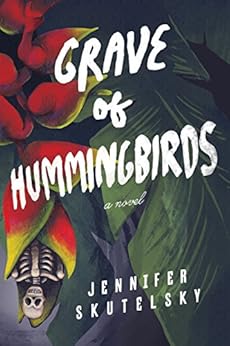Gregory stood still, aware of circumstances closing over his head in a flood, images pouring in: the body in the highlands, laid out on his table under a scalpel; the tattoos and their scabs; Alberto’s beatings at the hands of the police; the woman at the café, who resembled Nita too closely, who seemed an afterthought of Nita or a memory made whole in flesh and bone.[loc. 1552]
Grave of Hummingbirds begins with a mysterious murder and mutilation in Colibrí, a remote Andean town. The local doctor, Gregory Moreno, notes the victim's resemblance to Nita, the dead wife he's still mourning. (Several other men in Colibrí seem to have been in love with Nita too.) Then two American tourists arrive in town: forensic anthropologist Sophie -- who also bears a remarkable resemblance to Nita -- and her teenaged son Finn. They have come to witness an ancient, savage ritual that involves tying a condor (symbolising the native population) to a bull (symbolising the Spanish invaders). Gregory, who loves animals, is against this. So is his young protégé Alberto, though not for the same reasons.
There are some beautiful phrases in this novel, but on the whole it felt unfinished, in need of a further edit. Sophie and Finn have an air of the white saviour about them. Their arrival in Colibrí precipitates major changes. They are the only ones who can see or hear the ghosts of Colibrí's disappeared. Both are the focus of desire and fascination from the townsfolk. And only with their appearance can the poor folk of Colibrí find justice, understanding and closure.
I'm unhappy about the characterisation, too. Sophie, who is a single mother and has visited many of the world's most troubled locations as a forensic anthropologist, crumbles into near-hysteria under pressure. Finn's great dream is to be a ballet dancer, but he decides to postpone his ambitions at the drop of a hat. And Nita turns out to have been harbouring a tragic secret -- a concealment that, given other characters' perception of her, seems improbable.
The novel's ending seems hurried, abrupt: everything (well, most things) wrapped up neatly, regardless of whether it makes narrative or logical sense. Skutelsky has a gift for lyrical writing, but it doesn't show to best advantage in this, her first novel.

No comments:
Post a Comment